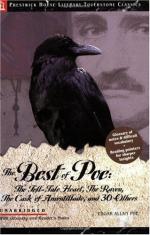Yet there is beauty in his designs for the “Ancient Mariner,” unreal as they are, and a consecutiveness rare in a series by Dore. The Rime afforded him a prolonged story, with many shiftings of the scene. In The Raven sound and color preserve their monotone and we have no change of place or occasion. What is the result? Dore proffers a series of variations upon the theme as he conceived it, “the enigma of death and the hallucination of an inconsolable soul.” In some of these drawings his faults are evident; others reveal his powerful originality, and the best qualities in which, as a draughtsman, he stood alone. Plainly there was something in common between the working moods of Poe and Dore. This would appear more clearly had the latter tried his hand upon the “Tales of the Grotesque and Arabesque.” Both resorted often to the elf-land of fantasy and romance. In melodramatic feats they both, through their command of the supernatural, avoided the danger-line between the ideal and the absurd. Poe was the truer worshipper of the Beautiful; his love for it was a consecrating passion, and herein he parts company with his illustrator. Poet or artist, Death at last transfigures all: within the shadow of his sable harbinger, Vedder’s symbolic crayon aptly sets them face to face, but enfolds them with the mantle of immortal wisdom and power. An American woman has wrought the image of a star-eyed Genius with the final torch, the exquisite semblance of one whose vision beholds, but whose lips may not utter, the mysteries of a land beyond “the door of a legended tomb.”
EDMUND C. STEDMAN.
THE POEM.
[Illustration]
THE RAVEN.
Once upon a midnight dreary, while I pondered, weak
and weary,
Over many a quaint and curious volume of forgotten
lore,
While I nodded, nearly napping, suddenly there came
a tapping,
As of some one gently rapping, rapping at my chamber
door.
“’T is some visiter,” I muttered,
“tapping at my chamber door—
Only
this, and nothing more.”
Ah, distinctly I remember it was in the bleak December,
And each separate dying ember wrought its ghost upon
the floor.
Eagerly I wished the morrow:—vainly I had
sought to borrow
From my books surcease of sorrow—sorrow
for the lost Lenore—
For the rare and radiant maiden whom the angels name
Lenore—
Nameless
here for evermore.
And the silken sad uncertain rustling of each purple
curtain
Thrilled me—filled me with fantastic terrors
never felt before;
So that now, to still the beating of my heart, I stood
repeating
“’T is some visiter entreating entrance
at my chamber door
Some late visiter entreating entrance at my chamber
door;—
This
it is, and nothing more.”




